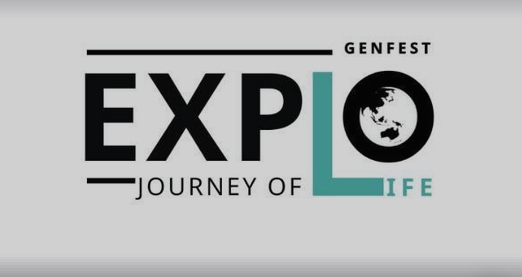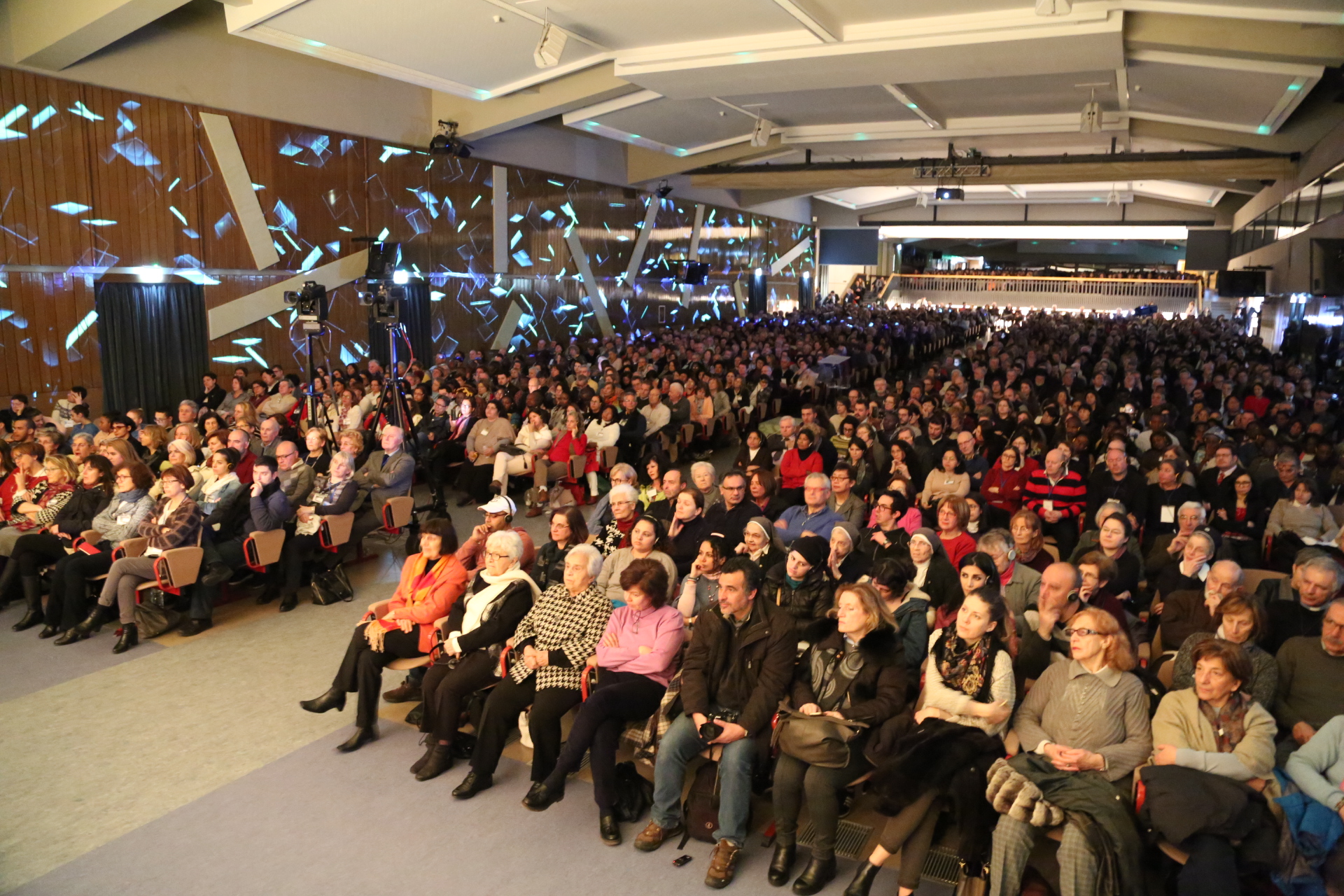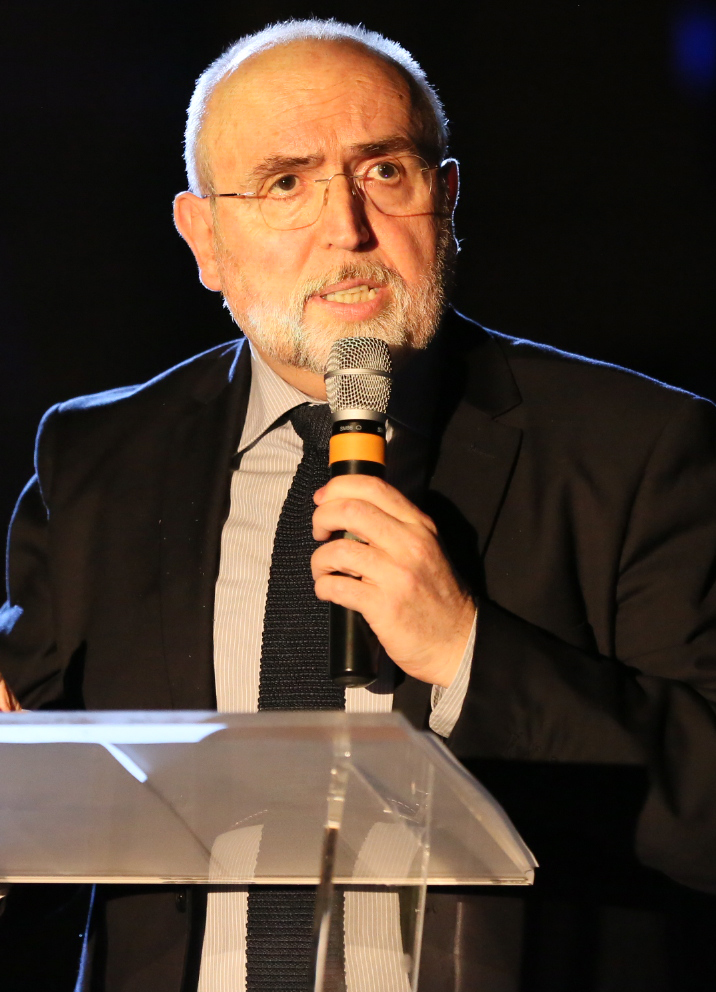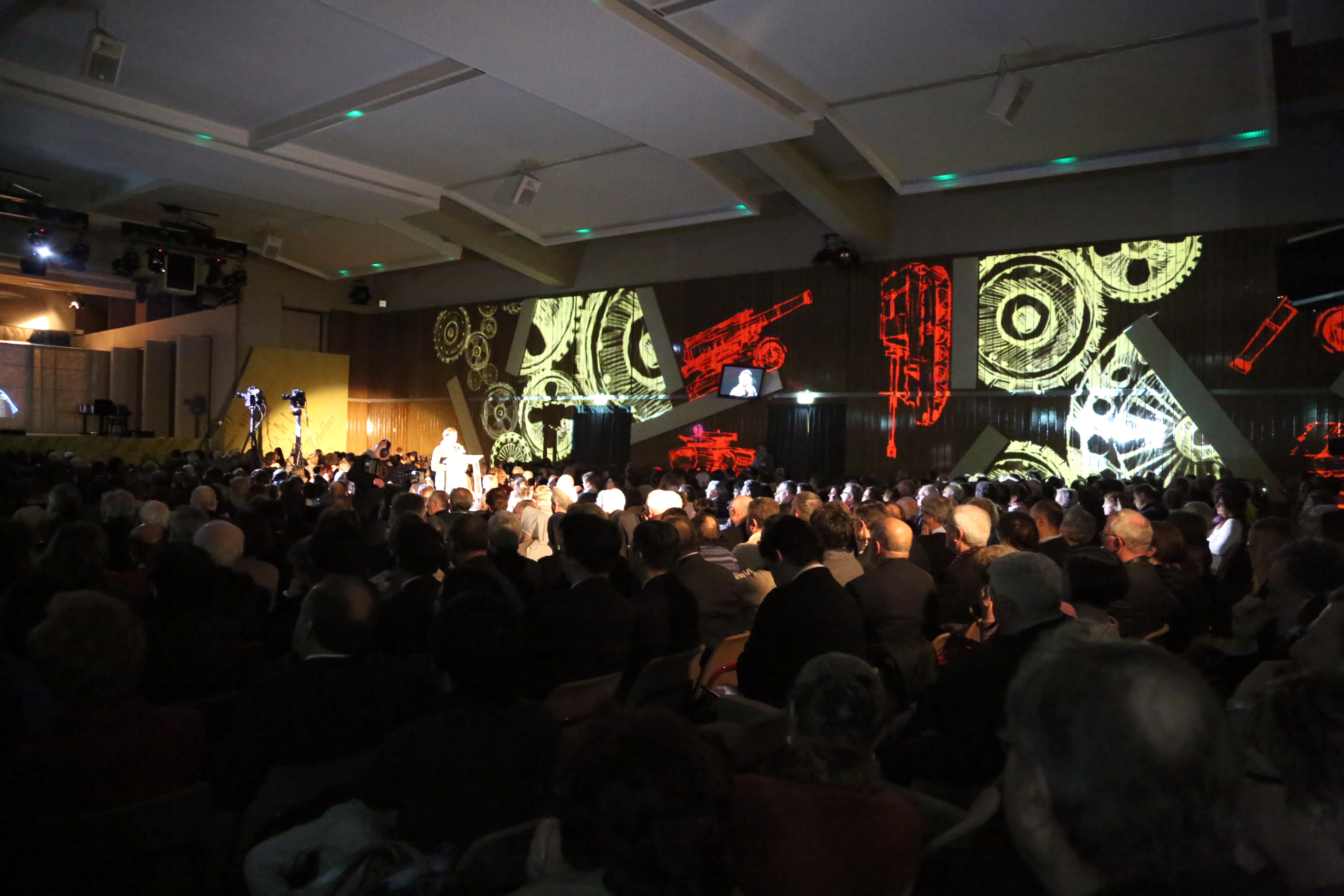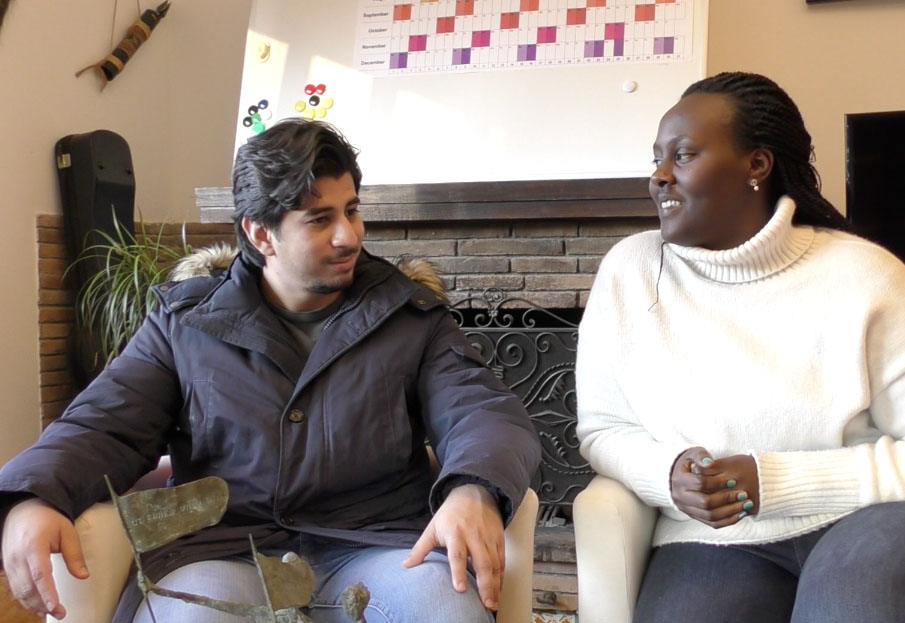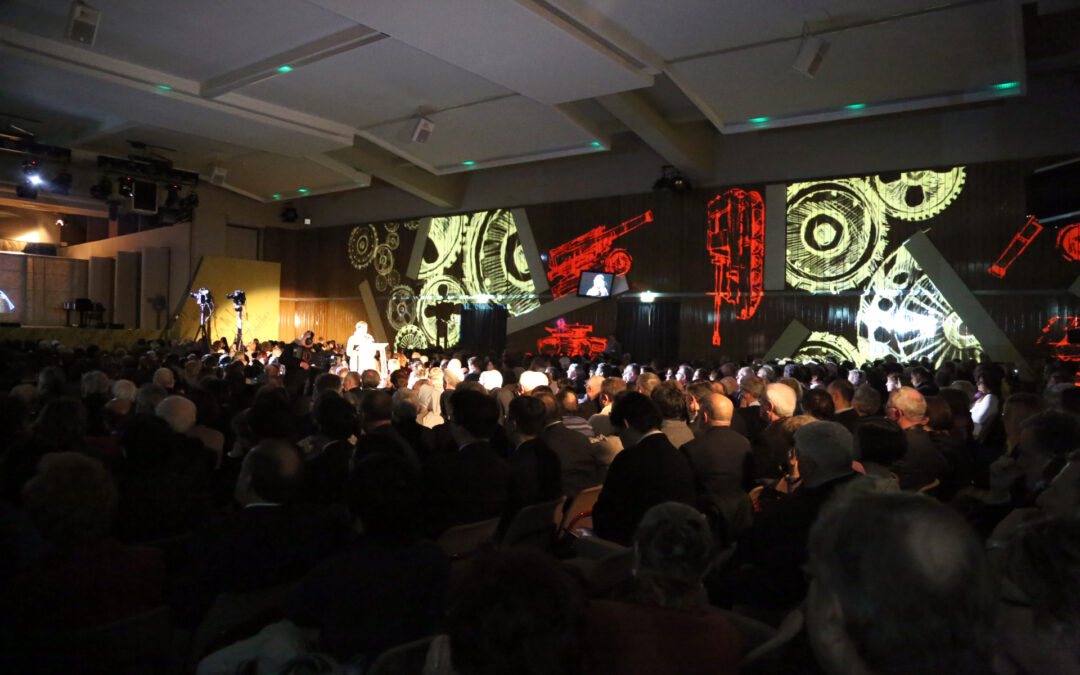
A dream that renews itself
The series began with an event that had music, poetry, and choreography, to highlight and accompany the words of testimony in the year marking the tenth anniversary of the Focolare founder’s death. More that two thousand people from around the world, religious leaders, including Vatican Secretary of State, Cardinal Piero Parolin, as well as people from the world of culture, communications and institutions to take part, on Saturday, March 3rd, in what many called a celebration of a life rather than a commemoration. It was a celebration of the life that continues to emerge from Chiara Lubich’s charism of unity in a variety of contexts in today’s world, often in hostile environments of war and degradation, producing social transformation that is marked by the life of the Gospel. Adriana is a Brazilian artist: “I didn’t want to stay closed inside a studio. Chiara told me: choose the God who made you an artist.” Out of love for her brothers and sisters and her willingness to be part a social project in the slums of Pedreira in south San Paolo, providing a roof for 500 families living in extreme poverty, a new opportunity was born for her to bring her talents to fruition. “I came here,” Adriana said, “to pay homage to Chiara.” Roberto and Maurizio, in Italy, opened a fish business run according to the principles of the Economy of Communion, because “If our life is all based on profit, what good is it? No one will remember us for the money we had, but for the good that we did.” Maria worked for 15 years in a school on the difficult outskirts of Paris, which most teachers left behind at first chance. “Those children should be able to have the same opportunities as those who are schooled in the best neighbourhoods of Paris.” Business owners Letizia and her husband have declined a major contract and risked failure, rather than produce arms materials to be used in war. A Syrian couple shared their testimony via video: “We didn’t want to escape the war, so that we wouldn’t have to close our school for deaf children. Where would they have gone?” The story of a Philippine child was entrusted to the voice and intense acting of an actress, taken in the community centre of Bukas Palad (With Open Hands), in Manila: “I’m grateful that from a poor person I’ve become a special person who is loved. This is where my rebirth began.” These are some of the fruits of the intrinsic social dimension of the charism of Chiara Lubich, as it was defined by Focolare co-President, Jesús Morán: “Chiara wasn’t a reformer. Her dream aimed higher than that, to the anthropological and theological foundation of all social reform – universal brotherhood.” Maria Voce remarked on the premises of an experiences that has reached 182 countries all over the world, with tangible fruits of brotherhood, such as the 25 little cities on all the continents, small blueprints of a world that is united. She recounts: During the years of the Second World War, “the first women focolarini never spared themselves from running from one end of Trent to the other, when it came to assisting someone in need. They invited the poor into their home to share their meals with them, putting out their best tablecloth, seated around the table: a focolarina, a poor person, a focolarina, a poor person. They fed the poor, but as brothers and sisters, never as benefactors. The Gospel which they read in the candlelight in the air-raid shelters and discovered and lived with intensity in the Light that was breaking into their lives, was revealing itself to be a source of profound social transformation. On the large wall of the hall, which had been turned into a cinema screen, pictures of the Movement’s long history were being projected to accompany the narration of the story that began from a dream: “ This is the great attraction of modern times: to enter into highest contemplation and stay mixed in with the crowd, one person next to the other.” The preferential option for the least of these – “salvaged from anonymity and made into protagonists” has been a characteristic of the Focolare from its first dawning. Wherever Chiara Lubich is remembered in the world, this dream is renewed. Chiara FavottiSocial-One: Social Sciences in dialogue
The Department of Political, Social and Communication Sciences of the University of Salerno and the Social-One research network, under the auspices of the Sociological Theories and Social Transformations Section of the Italian Association of Sociology (AIS) and in partnership with 11 universities and research institutes in Italy and worldwide, promote the conference “Sociological Imagination and Social Promotion: the category of “agapic action” to interpret the changes and to imagine new futures”. The aim of the conference is to investigate all the perspectives of analysis and action which have been raised by the members of the agapic action in the context of human and social disciplines with the hypothesis that the concept may offer new interpretations and perspectives of interventions for the promotion of a pluralistic society based on equality, inclusiveness and particularly dialogue. The conference focuses on four areas, which will be analyzed both from the scientific and academic point of view within the panels, and from the point of view of action-intervention, through the collection of best practices, which will be exhibited within of the Social Expo. The areas are: 1) Protagonist communities, sharing cultures and grassroots movements 2) Cooperation and dialogue in the field of macro-social actions 3) Relationships, inclusion and well-being in social policies 4) Plurality, dialogue and identity processes Official languages in plenary sessions: Italian, English, Spanish. The Scientific Committee of the international conference is coordinated by Gennaro Iorio (University of Salerno) and composed by:
- CALLEBAUT BERNHARD – Istituto Universitario Sophia (Italy)
- CAMPANINI ANNA MARIA – Università di Milano Bicocca (Italy)
- HOCHSCHILD MICHAEL – Time-lab (France)
- MAGATTI MAURO – Università Cattolica del Sacro Cuore di Milano (Italy)
- MARTINS PAULO HENRIQUE – Universidade Federal de Pernambuco – UFPE (Brazil)
- MONGELLI ANGELA – Università di Bari (Italy)
- MORA EMANUELA – Università Cattolica del Sacro Cuore di Milano (Italy)
- ORTEGA SANTO PEDRO JOSE – Universidade Autónoma de Santo Domingo – UASD (Dominican Republic)
- RAMA RUDINA – University of Tirana (Albania)
- REMBIERZ MAREK – University of Silesia in Katowice (Poland)
- SALAS MARCELO – Universidad del Salvador en Buenos Aires (Argentina)
- WAGNER IZABELA – University of Warsaw (Poland)
- WIELECKI KRZYSZTOF – Cardinal Stefan Wyszynski University (Poland)
For information: Social-One online Download invitation
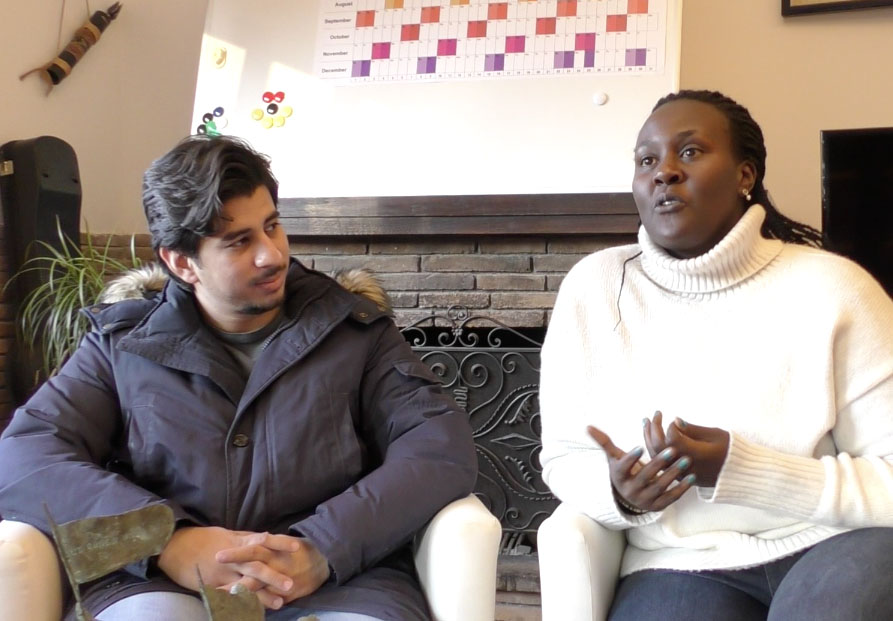
The voice of the youth
It will be a week of work to get to know the reality of kids and youths of the world, their ambitions, hopes, fears, expectations, and to hear what they have to say. It will be a moment of sharing which will be channeled, with all the other contributions received, into the ”Instrumentum laboris” in view of the Synod in October, defined by Pope Francis “not about, but of the youth.” “In this pre-synod Meeting– explained Card. Lorenzo Baldisseri, Secretary General of the Synod – we will try to better understand what they think of themselves and of the adults, how they live the faith and what difficulties they encounter as Christians, how they plan their life and what problems they meet in discerning their vocation, how they see the Church today, and how they would like it to be.” There will be Catholics, other Christian faiths and other religions, delegates of associations and movements, but also agnostics, or people coming from situations of unease like jail or drug dependency. Stella Marilene, 24 and Nelson, 29, of the Focolare Movement will also participate in the works (together with a girl from Paraguay, Noemi Sánchez). While anxiously waiting for that day, we met them at the Gen International centre, where all are working intensely for the world events of 2018: besides the Synod of October, also the Genfest in Manila in July.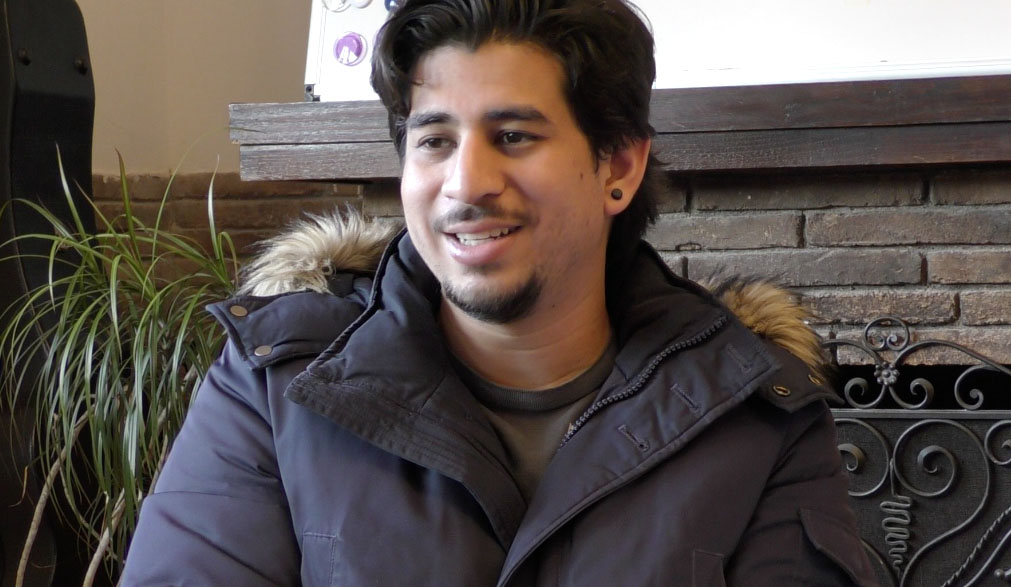 What is the situation of the youth in your country? “In Salvador.” answered Nelson, “the general situation of the youth differs from inside and outside the cities. Life outside is more difficult, services are lacking, and education is guaranteed only up to the compulsory education. Despite this the youth have huge aspirations and greater determination to make their dreams come true.” Marilene explained: “In Burundi we are undergoing a serious political crisis. Unemployment is sky high and also is uncertainty for the future. The youths often leave the country to seek other prospects elsewhere.” At the meeting, they say, they will carry out the role of facilitators of the linguistics groups in Spanish and French. “It will be our chance to do our part, a small contribution – Nelson added – but we shall do it with all our hearts.” And Marilene: “Through the synod’s official site (www.synod2018.va) and the social network connected, all the youths will be able to let their voice be heard and send proposals, as also those who cannot participate directly.” Speaking about communication, beyond the fears with which adults often regard the youths, as to the risk of detaching themselves from “reality” and immersing themselves in a virtual hub, what does communication mean for you? “Times have changed–Nelson answered – we are immersed in technology which effectively helps to bridge distances. But we have to try to make it possibly more humane. Cell phones and tablets draw people closer but communicating “face to face” with those who we really see before us is another thing altogether. In this sense we, the youth, can take the first step.” Marilene added: “For authentic communication we have to think of “what” we communicate.”
What is the situation of the youth in your country? “In Salvador.” answered Nelson, “the general situation of the youth differs from inside and outside the cities. Life outside is more difficult, services are lacking, and education is guaranteed only up to the compulsory education. Despite this the youth have huge aspirations and greater determination to make their dreams come true.” Marilene explained: “In Burundi we are undergoing a serious political crisis. Unemployment is sky high and also is uncertainty for the future. The youths often leave the country to seek other prospects elsewhere.” At the meeting, they say, they will carry out the role of facilitators of the linguistics groups in Spanish and French. “It will be our chance to do our part, a small contribution – Nelson added – but we shall do it with all our hearts.” And Marilene: “Through the synod’s official site (www.synod2018.va) and the social network connected, all the youths will be able to let their voice be heard and send proposals, as also those who cannot participate directly.” Speaking about communication, beyond the fears with which adults often regard the youths, as to the risk of detaching themselves from “reality” and immersing themselves in a virtual hub, what does communication mean for you? “Times have changed–Nelson answered – we are immersed in technology which effectively helps to bridge distances. But we have to try to make it possibly more humane. Cell phones and tablets draw people closer but communicating “face to face” with those who we really see before us is another thing altogether. In this sense we, the youth, can take the first step.” Marilene added: “For authentic communication we have to think of “what” we communicate.”  In his message for the youth day, which will end the pre-synod Meeting, Pope Francis mentioned the “fears” of the youth. “Often the youths are scared of going forward, to make choices from which they cannot turn back. “Personally,” Marilene explained, “I try to live God’s will in the present moment. Each one has his own story, and I entrust myself to Him.” Nelsno continued: “In such a materialistic world, often the message the adults pass to the youths concerns studying, working, earning, or buying a nice house. The dialogue between the first and second generation is important, but it should not destroy one’s dreams. Together, our energy and their wisdom can do a lot.” Being listened to means taking up some responsibilities. “It is a big responsibility to speak out for the youth. It’s an opportunity offered by the Church which wants to dialogue with all, and not only with the Catholics. It’s here that we Gen can offer our experience, because we have already started to walk together, with Christians of other faiths and also with agnostics. This is why I would call all the youths, also from afar, to participate! Let’s make our voice be heard.” Chiara Favotti
In his message for the youth day, which will end the pre-synod Meeting, Pope Francis mentioned the “fears” of the youth. “Often the youths are scared of going forward, to make choices from which they cannot turn back. “Personally,” Marilene explained, “I try to live God’s will in the present moment. Each one has his own story, and I entrust myself to Him.” Nelsno continued: “In such a materialistic world, often the message the adults pass to the youths concerns studying, working, earning, or buying a nice house. The dialogue between the first and second generation is important, but it should not destroy one’s dreams. Together, our energy and their wisdom can do a lot.” Being listened to means taking up some responsibilities. “It is a big responsibility to speak out for the youth. It’s an opportunity offered by the Church which wants to dialogue with all, and not only with the Catholics. It’s here that we Gen can offer our experience, because we have already started to walk together, with Christians of other faiths and also with agnostics. This is why I would call all the youths, also from afar, to participate! Let’s make our voice be heard.” Chiara Favotti
Mary, the driving force behind social action
https://vimeo.com/258422297 The President of the Focolare Movement shared a few points from her talk, explaining that – as Chiara Lubich herself said – Mary, the Mother of God, is the form and model of social action in the Movement. Maria Voce: I see Chiara always at my side, not with my eyes of course, but I feel she is always with me. Often people ask, do you draw inspiration from what Chiara said? Actually, I say no. I don’t draw inspiration from what Chiara said, I draw inspiration from her and ask myself: what would Chiara say now? What would Chiara do now? What answer would she invent for this problem that has come up? I try to listen to the Holy Spirit, seeking to do so with the same attention and depth as she did, and then I act. Chiara told us that she understood Mary in a very special way when she discovered her greatness as the mother of God. She discovered a Mary whom she herself said she had never known before: not the little child or the pure young girl from Nazareth, nor the simple housewife, but a Mary so great that God had chosen her to be the mother of his son, of the Word of God made flesh, so of God himself. This Mary, who was pleasing to God because of her humility, can give him glory through what he works in her. In her he works the great things that God wants to do: equality among all the brothers and sisters in the human family; a just distribution of goods in the world; that all people should be able to use the goods that God created for everyone; that all should recognise one another as brothers and sisters. Mary knows how to do this because she is a mother. I believe the characteristics of the social works arising from Chiara’s charism have, precisely, the characteristic of having been done by a mother who loves her children and who wants their greatest good. Above all, she wants them to be united among themselves, bound together by mutual love and that this love should underpin their relationships in society. Therefore, a new society animated by Gospel love, with a mother who is Mary.
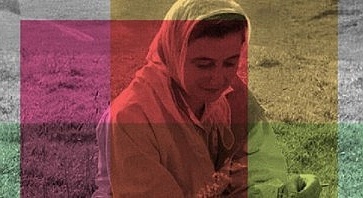
To embroider patterns of light on the crowd
 “This is the great attraction of modern times: to penetrate to the highest contemplation while mingling with everyone, one person alongside others. I would say even more: to lose oneself in the crowd in order to fill it with the divine, like a piece of bread dipped in wine. I would say even more: made sharers in God’s plans for humanity, to embroider patterns of light on the crowd, and at the same time to share with our neighbor shame, hunger, troubles, brief joys. Because the attraction of our times, as of all times, is the highest conceivable expression of the human and the divine, Jesus and Mary: the Word of God, a carpenter’s son; the Seat of Wisdom, a mother at home.” Published in “Chiara Lubich: Essential Writings”, New City Press, Hyde Park, New York, 2002, p 169.
“This is the great attraction of modern times: to penetrate to the highest contemplation while mingling with everyone, one person alongside others. I would say even more: to lose oneself in the crowd in order to fill it with the divine, like a piece of bread dipped in wine. I would say even more: made sharers in God’s plans for humanity, to embroider patterns of light on the crowd, and at the same time to share with our neighbor shame, hunger, troubles, brief joys. Because the attraction of our times, as of all times, is the highest conceivable expression of the human and the divine, Jesus and Mary: the Word of God, a carpenter’s son; the Seat of Wisdom, a mother at home.” Published in “Chiara Lubich: Essential Writings”, New City Press, Hyde Park, New York, 2002, p 169.
Living the Gospel: “Sharing in God’s Life”
Starting Again From Zero When I was still quite small my father left us. My mother fell into a deep depression and began to drink. I was raised by my maternal grandmother. When my mother died, I was in my adolescence and I was harbouring inside of me a desire for revenge. Then, I met a girl who introduced me into her parish community. Through those people, little by little, I discovered God, inner peace and balance. When we got married, I was able to say that that community was my family. One day, at work, a man came and introduced himself as my father. I was desolate and feared my reaction. Despite the surprise, I welcomed him warmly and told him about the daughter that had been born, and invited him home. A week later he came over with his partner. My wife and I gave them a warm and festive welcome. More than grandparents, they felt like adopted children. Since then, family life changed and so did theirs. It was as if the past no longer existed; only the desire to start from zero existed. P.P. – Serbia The Caricature A classmate had drawn a caricature of me, photocopied it and spread it around the school. I felt like beating him up! But then I decided to approach him and speak to him calmly. In fact, I invited him to my house, to do homework and go to see a film. When he asked me why I responded like that, I told him that I had learned to see Jesus in every neighbour, knowing that we all can make mistakes. Surprised, he wanted to know more. Now he’s also trying to put the words of the Gospel into practice. Daniel – Brazil The Humanity of Jesus The first signs of my multiple-sclerosis go back to when my wife, Susi, was expecting our daughter, Tecla. I, who was always used to working and playing sport, now found myself realizing that it was more and more difficult to move, until I was completely immobile. And yet, from the onset of the illness, I felt the reawakening of a desire for values that were true. Many years have gone by since then. Being sick, seeing my legs no longer able to respond anymore, depending on others for everything, feeling pain, knowing humiliation, feeling different: I experienced all that. But my suffering helped me to understand the “humanity” of Jesus much more than before. Renato – Italy The Florist It was a very cold night. An old flower-seller was trying to sell her flowers. She was wearing an old blanket and seemed resigned to watch the people go by with haste and indifference. I thought, if I were in her position, I’d enjoy something warm. But there was no coffee shop in sight. So I found a boy selling homemade sweets. I bought one for her. When she took it and thanked me, she didn’t say many words, but her eyes showed how moved she was. I went on my way with the feeling of her gaze still upon me. Szidi – Romania
Champions of unity
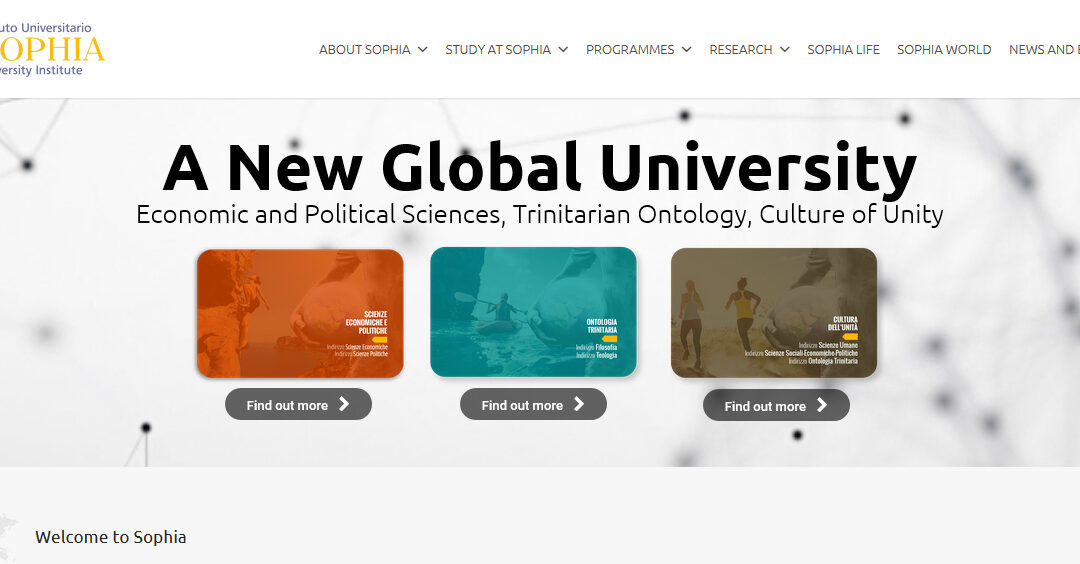
Sophia University’s New Website
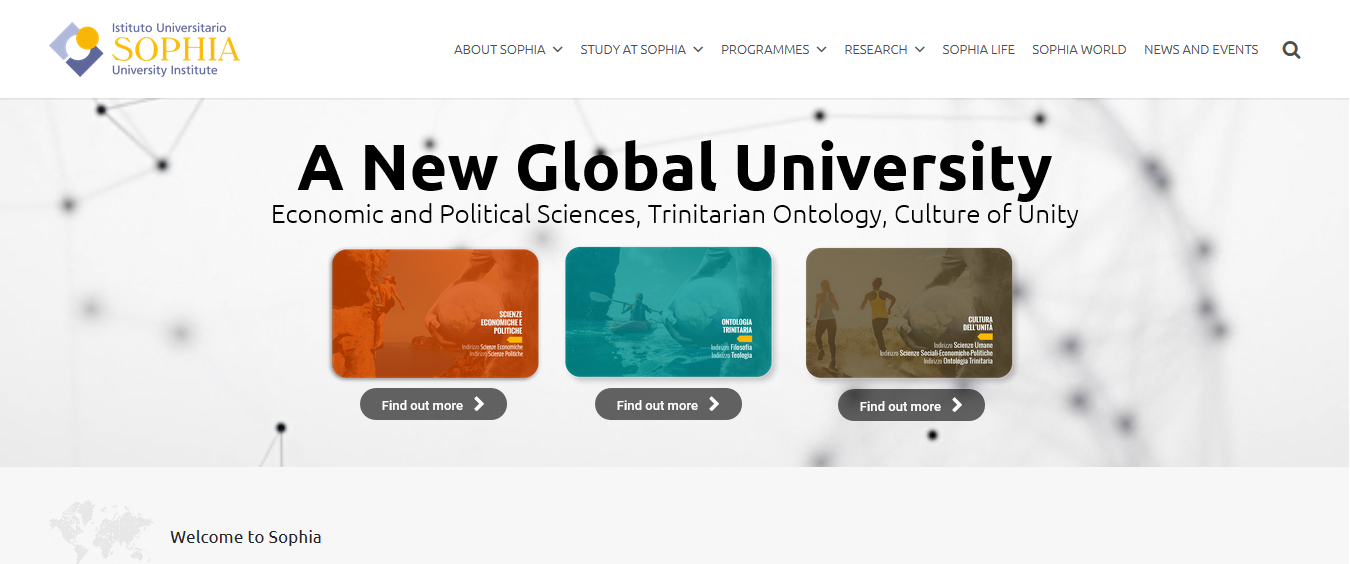 The new website expresses Sophia University Institute’s calling to become more and more global, not only because of its multidisciplinary approach to study and its cosmopolitan community of students and faculty, but also because of its openness and the soon to be opened training centres that will be added to the university of Loppiano near Florence, Italy. For ten years, Sophia has made dialogue and interaction among the different fields of knowledge an innovative method for overcoming the fragmenation, abstraction and isolation among the disciplines, with the goal of providing an open vision of the disciplines and the opportunity of comparing and combining their content, methods and results. Up until now Sophia has welcomed 450 students and faculty members from 50 countries and 4 continents. Visit the site
The new website expresses Sophia University Institute’s calling to become more and more global, not only because of its multidisciplinary approach to study and its cosmopolitan community of students and faculty, but also because of its openness and the soon to be opened training centres that will be added to the university of Loppiano near Florence, Italy. For ten years, Sophia has made dialogue and interaction among the different fields of knowledge an innovative method for overcoming the fragmenation, abstraction and isolation among the disciplines, with the goal of providing an open vision of the disciplines and the opportunity of comparing and combining their content, methods and results. Up until now Sophia has welcomed 450 students and faculty members from 50 countries and 4 continents. Visit the site
